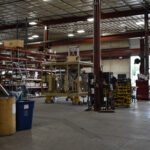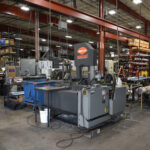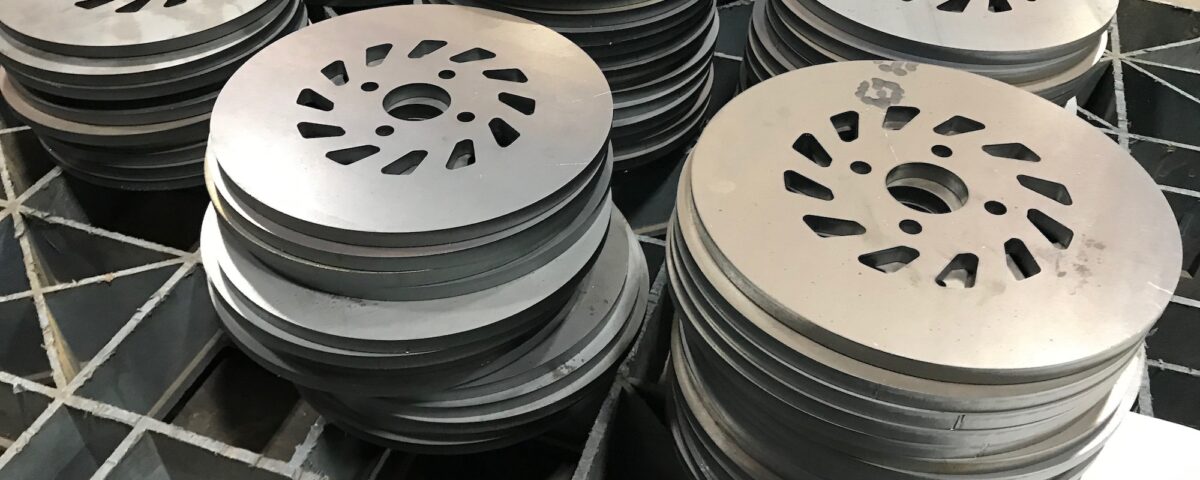
Horizontal and Vertical Milling
January 2, 2024
Electromechanical Assembly
February 29, 2024Have you ever wondered where all the tools and kitchen utensils that you use everyday are made?
Metal fabrication is used to create a wide range of products that we use in our daily lives. From the screws that hold our furniture together, to our toaster and even our car to drive to work.
Metal fabrication is a vital part of manufacturing. It creates countless products that we can’t live without. Metal fabrication is essential to the running of most businesses and homes.
Metal Fabrication Products
Metal fabrication is the backbone of many useful products. Some of these items are things that we use every day, and others are tools or parts used to create other things.
Here are a few examples.
- Bolts, screws and other fasteners
- Pipe fittings
- Hand Tools
- Cutlery
- Metal cans
- Body and parts of appliances
- Parts for cars
- Computer Parts
- The following are some examples of machinery that you can use
- Support for structural buildings
Metal fabricators are investing in new technologies and skills to increase their growth opportunities.
What is metal fabrication?
The process of sheet metal fabrication is to create products out of metal sheets. Metal fabricators can create a variety of metal products. Metal sheet manufacturing is available in both mass productions and custom products.
Metal manufacturing begins with sheet metal, which is typically less than a quarter inch thick. Metal sheets can be bent into different shapes because they are flexible enough.
You will have probably heard a lot of new terms used to describe different metalworking processes.
Metal fabricators use different techniques to fold, cut or shape metal sheet into a final product. Metal fabricators can also use a combination of metal fabrication techniques to create custom parts.
Metal fabricators can use these different techniques to get the sheet metal in the correct shape for your project.
- The cutting process is essential to achieving the desired shape and size of your metal sheets. cutting techniques include laser cutting, waterjet cutting, shearing or sawing.
- Casting is the process of creating parts or products from a mold or die.
- The technique of punching creates holes in metal. It is used for many parts that require fastening or latching.
- You can use stamping to create shapes or letters onto a metal panel or sheet.
- The process of folding is complex. Metal is folded into an angle, typically 90 degrees.
- The joining of metal sheets, bars or panels is known as welding. It is a common metal manufacturing process.
Metal fabricators are highly trained specialists who have been taught to work and cut metal with precision to get the best results. Take a look at the work that Atscott Mfg. can accomplish for you.
Different types of metal manufacturing
Metal manufacturing can be divided into three main categories.
- Industrial
- Commercial
- Structural
Industrial Metal Fabrication
Industrial fabrication is the production of parts and components that are used to manufacture industrial equipment and tools. These tools are used to make consumer goods.
Metal fabrication is used to make parts for heavy machinery and other equipment.
Metal fabricators are able to produce a variety of key products for the industrial sector, including:
- Bandsaws
- Tanks and silos
- Heavy machine parts
Water treatment, alternative energies, automotive and engineering are industries that use industrial metal fabrication.
Commercial Metal Fabrication
Commercial metal manufacturing is focused on products used in commercial buildings, such as restaurants and stores, shopping malls, parks, etc.
This category includes decorative or ornamental metalwork, which is used to enhance the aesthetics of a commercial structure.
Commercial metal fabrication involves the production of parts that are smaller and more precise compared to industrial and structural metal manufacture.
The following are the main commercial products:
- Guardrails
- Shelving
- Awnings
- Conveyors
- Restaurant sinks, wash stations and other equipment
Structural Metal Fabrication
Structural metalwork is able to provide everything that the building and construction industry needs. Fabricators of structural metal will produce metal components needed for shops, high rise buildings, or even your home. These projects need high-strength metals such as steel, which is used in the foundations of buildings.
The products of structural metal engineering include:
- Beams, girders and Trusses
- Platforms and ramps
- Stairs, walkways
- Towers
Metal Fabrication Process
Metal manufacturing, whether industrial, structural or commercial, follows several processes, from design to completion. Before completion, many metal fabrication projects undergo multiple processes. Even simple products can require more than just cutting and shaping.
Most metal fabrication projects follow the following steps from the initial design to the final product:
- You can also Design Your Own
- Prototype
- Programming
- Fabrication
- Finishing
- Assembly
- Design involves the analysis and refinement of the project requirements. A business may already have a working prototype which needs to be improved before it can go into full production. The design is an important part of any custom metal sheet project or work. AutoCAD is a program that modern metal fabricators use to design, develop and render design prototypes.
- Prototyping can be an important step in custom projects, as it allows you to test the product before it goes into mass production. The prototype is created using rapid sheet metal prototyping, or 3D printing. The prototype is tested to determine if it works. The design can then be adjusted.
- Programming will be the next step for projects that utilize computer-controlled machines to fabricate metal. Programming was required for automated cutting, punching and turning machines.
- Fabrication starts once the design and programming are complete. The fabrication process includes a number of steps and metal fabrication techniques, including cutting and punching, folding and welding.
- Finishing includes the refinement of surfaces and edges, or application of coatings like powder coating. This type of finishing is not required for all projects, as it depends on the final use of the product.
- Assembly can include adding electrical integrations or welding to complete a job.
What types of metals are manufactured?
Metal fabricators are able to use several different metals, and can fabricate metal parts using a wide range of metals. Metal manufacturing is primarily done with sheet metal, although some types can start as pipes, bars or tubes.
Metals used for metal fabrication include:
- Steel
- Aluminium
- Copper
- You can also find out more about Tin
- Gold
- Magnesium
- Iron
- Silver
- Nickel
Metals are generally able to be fabricated in some way, but the suitability for a particular project depends on its thickness, pliability and softness.
The sheet metal fabrication process for aluminum is different from that of steel because it’s a more flexible metal.
Metal Fabrication Industries
Metal fabrication and sheet metal manufacturing are used in many different industries, and their products are diverse. Metal fabricated products are versatile because they can be used for many different purposes.
Metal fabrication is used in the following industries:
- Buy it Now
- Telecommunications
- You can also find out more about the following:
- Lighting
- Architecture
- Construction
- Automobile
- Agriculture
- Education
- Military Personnel
Metal fabrication and metal engineering have many applications, from the foundations for your city’s tall buildings to the agricultural machinery that is essential to your food supply chain. Even the cutlery used to eat meals can be a part of metal fabrication.
All of these products, and possibly the ones that your business requires, require a certain level of expertise and skill to ensure they are professionally and accurately manufactured.
Atscott Mfg. has been providing metal manufacturing expertise to all of these sectors for more than 60 years. Atscott Mfg. can help you turn your ideas into metal.
